Unit 1 Relationships Lesson 2 How Do We Like Teachers’ Feedback? 课件(共17张PPT)
文档属性
| 名称 | Unit 1 Relationships Lesson 2 How Do We Like Teachers’ Feedback? 课件(共17张PPT) |
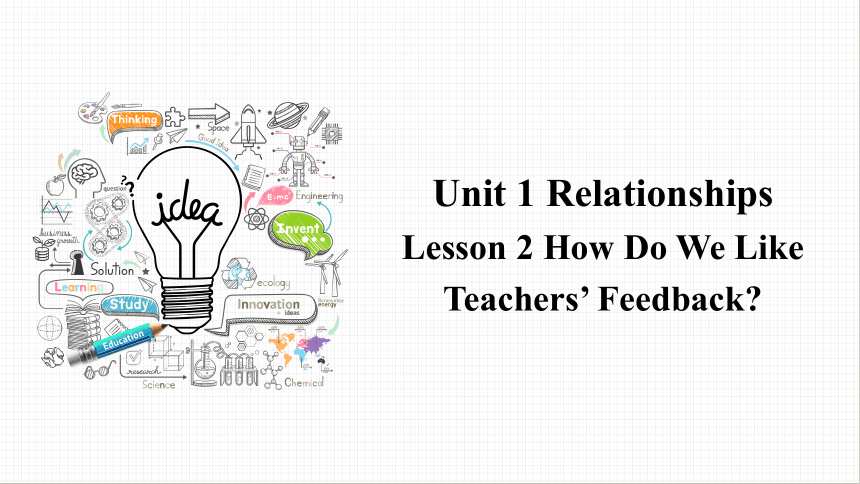
|
|
| 格式 | pptx | ||
| 文件大小 | 4.7MB | ||
| 资源类型 | 教案 | ||
| 版本资源 | 北师大版(2019) | ||
| 科目 | 英语 | ||
| 更新时间 | 2024-10-12 22:27:05 | ||
图片预览

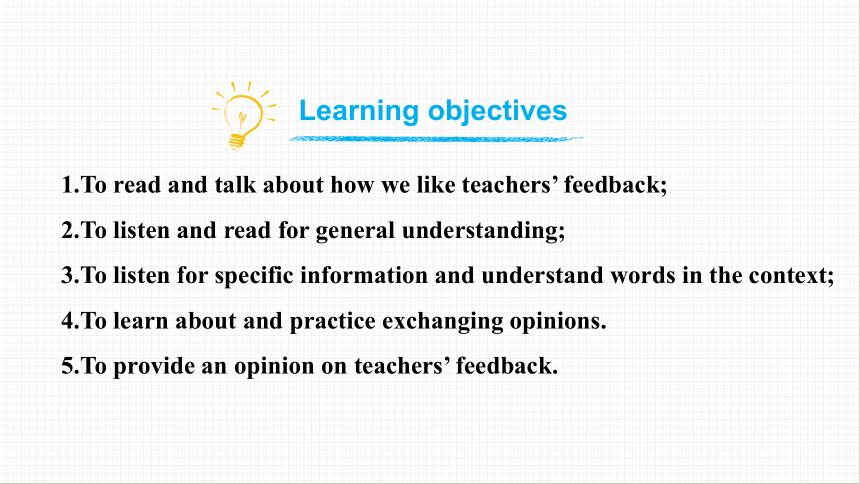
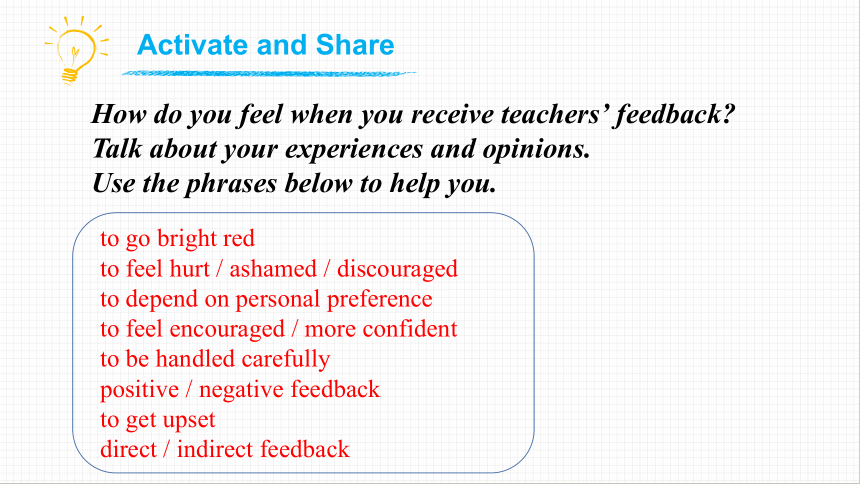

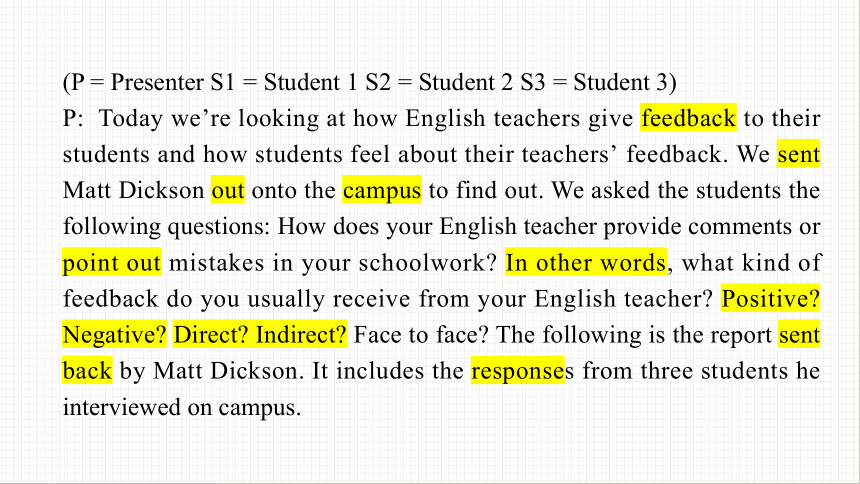
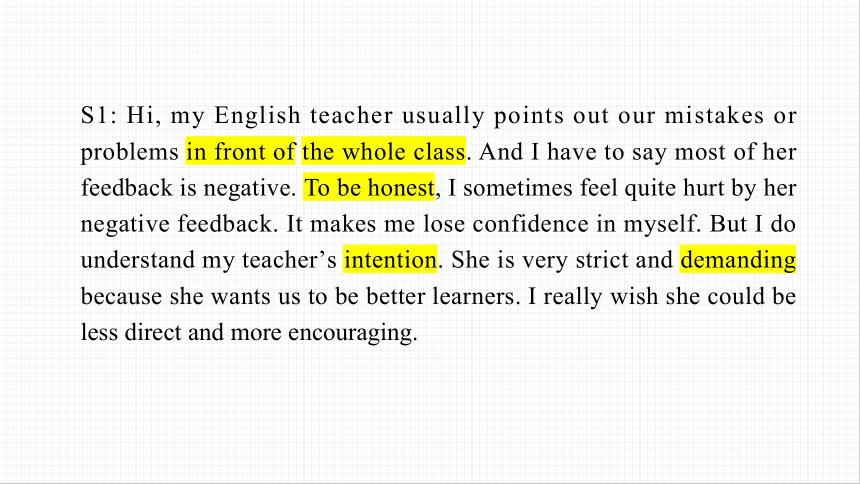
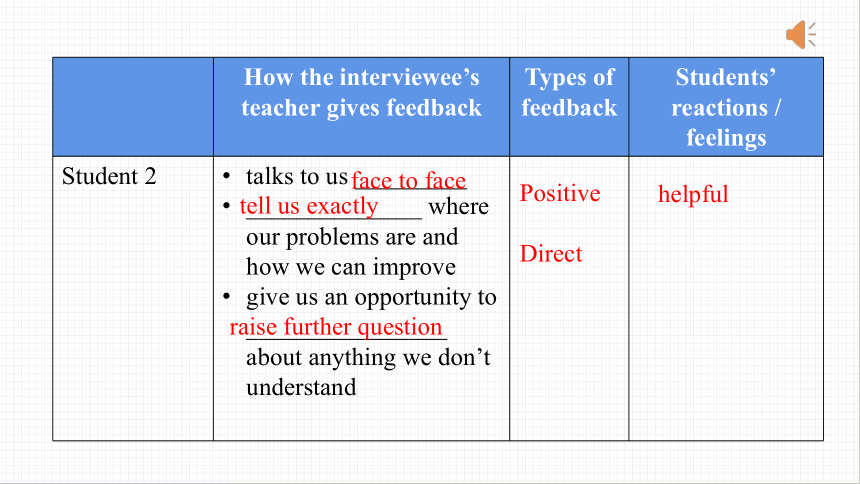
文档简介
(共17张PPT)
Unit 1 Relationships
Lesson 2 How Do We Like Teachers’ Feedback
1.To read and talk about how we like teachers’ feedback;
2.To listen and read for general understanding;
3.To listen for specific information and understand words in the context;
4.To learn about and practice exchanging opinions.
5.To provide an opinion on teachers’ feedback.
Learning objectives
to go bright red
to feel hurt / ashamed / discouraged
to depend on personal preference
to feel encouraged / more confident
to be handled carefully
positive / negative feedback
to get upset
direct / indirect feedback
How do you feel when you receive teachers’ feedback
Talk about your experiences and opinions.
Use the phrases below to help you.
Activate and Share
Three students are interviewed about their English teachers’
feedback for a campus radio programme.
Listen and complete the information in the second column of the table. Then, listen again and complete the rest of the table.
How the interviewee’s
teacher gives feedback Types of feedback Students’
reactions / feelings
Student 1 usually points out our _______ in front of the __________
mistakes
whole class
Negative
feel quite hurt lose confidence
Listen for understanding
(P = Presenter S1 = Student 1 S2 = Student 2 S3 = Student 3)
P: Today we’re looking at how English teachers give feedback to their students and how students feel about their teachers’ feedback. We sent Matt Dickson out onto the campus to find out. We asked the students the following questions: How does your English teacher provide comments or point out mistakes in your schoolwork In other words, what kind of feedback do you usually receive from your English teacher Positive Negative Direct Indirect Face to face The following is the report sent back by Matt Dickson. It includes the responses from three students he interviewed on campus.
S1: Hi, my English teacher usually points out our mistakes or problems in front of the whole class. And I have to say most of her feedback is negative. To be honest, I sometimes feel quite hurt by her negative feedback. It makes me lose confidence in myself. But I do understand my teacher’s intention. She is very strict and demanding because she wants us to be better learners. I really wish she could be less direct and more encouraging.
How the interviewee’s
teacher gives feedback Types of feedback Students’
reactions / feelings
Student 2 talks to us _________ ______________ where our problems are and how we can improve give us an opportunity to ________________ about anything we don’t understand
face to face
tell us exactly
raise further question
Positive
Direct
helpful
S2: Well, for any problem my English teacher finds with us, she talks to us face to face. Although it is very demanding for my teacher, it is more effective than other types of feedback. During the face-to-face communication, my teacher tells us exactly where our problems are and how we can improve. It also gives us an opportunity to raise further questions about anything we don’t understand. I think this kind of feedback is helpful. I love it.
How the interviewee’s
teacher gives feedback Types of feedback Students’
reactions / feelings
Student 3 gives very ________ _________ such as “good, excellent, well done” doesn’t ________ my mistakes and give suggestions
general
comments
point out
not enough
indirect
S3: Err, my English teacher often gives very general comments such as “good, excellent, well done”. He doesn’t point out my mistakes and give suggestions. However, a simple “good” or “bad” is not enough for me. I want to know where my strengths and weaknesses are. I think teachers’ feedback should be specific. For example, he can highlight my mistakes and say things like “you need to work on the past tenses some more”. In this way, I know where I need to improve.
Matt Dickson interviewed three students about their feelings of English teachers’ 1.________. The first student thinks his teacher’s feedback is negative and makes him lose 2. _________. But he understands her 3._________. The second student thinks the feedback from her teacher is more 4. _______ even though it is more 5. _________ for her teacher. She can raise 6. _________ questions about anything she doesn’t understand. The third student thinks his teacher often gives very
feedback
confidence
intention
effective
demanding
further
Listen to the dialogue again and complete the summary with the words from the listening.
general 7. _________. But he wants to know where his 8. _________ and weaknesses are. He thinks feedback should be 9. _________. For example, the teacher can 10. ________ his mistakes and say things like “ You need to work on the past 11. _____________.”
comments
strengths
specific
highlight
tenses
Listen to the conversation between two professors about giving teachers’ feedback to students. Find out their opinions and reasons.
opinions reasons
Professor Smith
Professor Jones
Try to give feedback in a less direct manner.
It is best to point out students’ problem directly.
Understand some students’ feelings about direct feedback. Negative feedback might hurt students’ confidence and interest in learning.
Students need to get used to tough comments when they don’t do good work.
Focus on Function
(J = Professor Jones S =Professor Smith)
J: Professor Smith, what do you think about the radio programme
S: I found it rather interesting. I understand some students’ feelings about negative feedback. So, I’m always careful about how I give feedback.
J: I believe it is best to point out students’problems directly. This is more effective because students can get to the point right away. Also, I think they should realise that any feedback isn’t personal.
S: Well, it is helpful to give specific feedback, but very negative feedback might hurt students’ confidence and interest in learning.
J: Perhaps that’s true. However, my opinion is that students need to get used to tough comments when they don’t do good work.
S: I can agree with you about that, but to be more helpful, if we need to give negative feedback, we should do it in a less direct manner, especially to those who are shy or sensitive.
J: I see your point. Perhaps I should try that. I want to help students but certainly don’t want to upset them.
Talk Builder
Exchanging opinions
1. ____________ it is best to point out students’ problems directly.
2. Also, ___________ they should realise that any feedback isn’t personal.
3. _________________ you about that, but to be more
helpful ...
4. ______________. Perhaps I should try that.
I believe
I think
I can agree with
I see your point
Listen again and plete the Talk Builder.
Choose three teachers who teach different subjects.Tell them what you liked about the feedback you have received from them in the past, and how you would like to receive their feedback in the future.
Speak
Unit 1 Relationships
Lesson 2 How Do We Like Teachers’ Feedback
1.To read and talk about how we like teachers’ feedback;
2.To listen and read for general understanding;
3.To listen for specific information and understand words in the context;
4.To learn about and practice exchanging opinions.
5.To provide an opinion on teachers’ feedback.
Learning objectives
to go bright red
to feel hurt / ashamed / discouraged
to depend on personal preference
to feel encouraged / more confident
to be handled carefully
positive / negative feedback
to get upset
direct / indirect feedback
How do you feel when you receive teachers’ feedback
Talk about your experiences and opinions.
Use the phrases below to help you.
Activate and Share
Three students are interviewed about their English teachers’
feedback for a campus radio programme.
Listen and complete the information in the second column of the table. Then, listen again and complete the rest of the table.
How the interviewee’s
teacher gives feedback Types of feedback Students’
reactions / feelings
Student 1 usually points out our _______ in front of the __________
mistakes
whole class
Negative
feel quite hurt lose confidence
Listen for understanding
(P = Presenter S1 = Student 1 S2 = Student 2 S3 = Student 3)
P: Today we’re looking at how English teachers give feedback to their students and how students feel about their teachers’ feedback. We sent Matt Dickson out onto the campus to find out. We asked the students the following questions: How does your English teacher provide comments or point out mistakes in your schoolwork In other words, what kind of feedback do you usually receive from your English teacher Positive Negative Direct Indirect Face to face The following is the report sent back by Matt Dickson. It includes the responses from three students he interviewed on campus.
S1: Hi, my English teacher usually points out our mistakes or problems in front of the whole class. And I have to say most of her feedback is negative. To be honest, I sometimes feel quite hurt by her negative feedback. It makes me lose confidence in myself. But I do understand my teacher’s intention. She is very strict and demanding because she wants us to be better learners. I really wish she could be less direct and more encouraging.
How the interviewee’s
teacher gives feedback Types of feedback Students’
reactions / feelings
Student 2 talks to us _________ ______________ where our problems are and how we can improve give us an opportunity to ________________ about anything we don’t understand
face to face
tell us exactly
raise further question
Positive
Direct
helpful
S2: Well, for any problem my English teacher finds with us, she talks to us face to face. Although it is very demanding for my teacher, it is more effective than other types of feedback. During the face-to-face communication, my teacher tells us exactly where our problems are and how we can improve. It also gives us an opportunity to raise further questions about anything we don’t understand. I think this kind of feedback is helpful. I love it.
How the interviewee’s
teacher gives feedback Types of feedback Students’
reactions / feelings
Student 3 gives very ________ _________ such as “good, excellent, well done” doesn’t ________ my mistakes and give suggestions
general
comments
point out
not enough
indirect
S3: Err, my English teacher often gives very general comments such as “good, excellent, well done”. He doesn’t point out my mistakes and give suggestions. However, a simple “good” or “bad” is not enough for me. I want to know where my strengths and weaknesses are. I think teachers’ feedback should be specific. For example, he can highlight my mistakes and say things like “you need to work on the past tenses some more”. In this way, I know where I need to improve.
Matt Dickson interviewed three students about their feelings of English teachers’ 1.________. The first student thinks his teacher’s feedback is negative and makes him lose 2. _________. But he understands her 3._________. The second student thinks the feedback from her teacher is more 4. _______ even though it is more 5. _________ for her teacher. She can raise 6. _________ questions about anything she doesn’t understand. The third student thinks his teacher often gives very
feedback
confidence
intention
effective
demanding
further
Listen to the dialogue again and complete the summary with the words from the listening.
general 7. _________. But he wants to know where his 8. _________ and weaknesses are. He thinks feedback should be 9. _________. For example, the teacher can 10. ________ his mistakes and say things like “ You need to work on the past 11. _____________.”
comments
strengths
specific
highlight
tenses
Listen to the conversation between two professors about giving teachers’ feedback to students. Find out their opinions and reasons.
opinions reasons
Professor Smith
Professor Jones
Try to give feedback in a less direct manner.
It is best to point out students’ problem directly.
Understand some students’ feelings about direct feedback. Negative feedback might hurt students’ confidence and interest in learning.
Students need to get used to tough comments when they don’t do good work.
Focus on Function
(J = Professor Jones S =Professor Smith)
J: Professor Smith, what do you think about the radio programme
S: I found it rather interesting. I understand some students’ feelings about negative feedback. So, I’m always careful about how I give feedback.
J: I believe it is best to point out students’problems directly. This is more effective because students can get to the point right away. Also, I think they should realise that any feedback isn’t personal.
S: Well, it is helpful to give specific feedback, but very negative feedback might hurt students’ confidence and interest in learning.
J: Perhaps that’s true. However, my opinion is that students need to get used to tough comments when they don’t do good work.
S: I can agree with you about that, but to be more helpful, if we need to give negative feedback, we should do it in a less direct manner, especially to those who are shy or sensitive.
J: I see your point. Perhaps I should try that. I want to help students but certainly don’t want to upset them.
Talk Builder
Exchanging opinions
1. ____________ it is best to point out students’ problems directly.
2. Also, ___________ they should realise that any feedback isn’t personal.
3. _________________ you about that, but to be more
helpful ...
4. ______________. Perhaps I should try that.
I believe
I think
I can agree with
I see your point
Listen again and plete the Talk Builder.
Choose three teachers who teach different subjects.Tell them what you liked about the feedback you have received from them in the past, and how you would like to receive their feedback in the future.
Speak
同课章节目录
- Unit 1 Relationshis
- Lesson 1 Teachers
- Lesson 2 How Do We Like Teachers’ Feedback?
- Lesson 3 So Close,Yet So Fa
- Unit 2 Success
- Lesson 1 Money vs Success
- Lesson 2 Top Five Secrets of Success
- Lesson 3 Getting to the Top
- Unit 3 Conservation
- Lesson 1 The Sixth Extinction
- Lesson 2 War on Plastic Packets
- Lesson 3 The Road to Destruction
